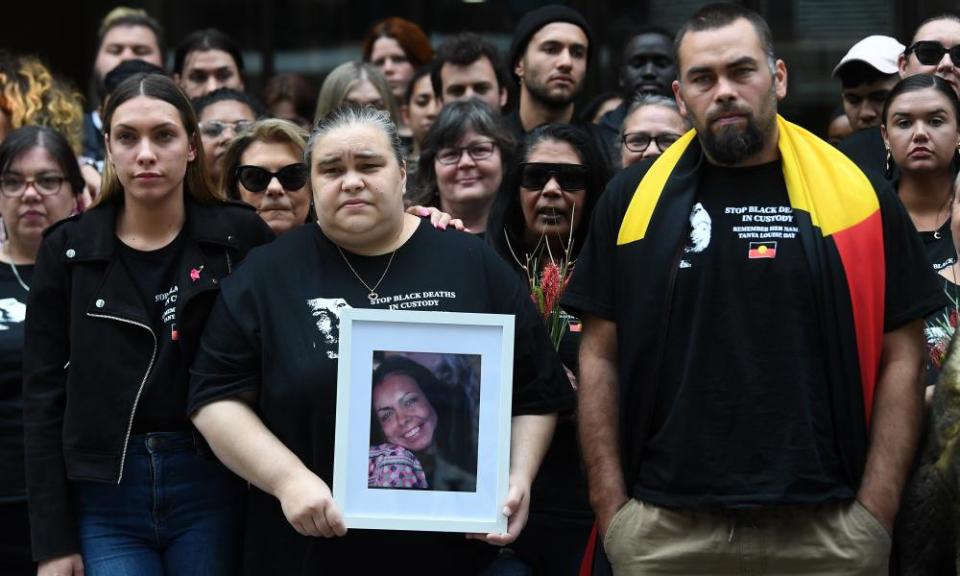Victoria delays decriminalising public drunkenness until 2022

Victoria has committed to a health-based response to public drunkenness following the recommendations of a group set up in the wake of the death of Yorta Yorta woman Tanya Day, but the laws to decriminalise public drunkenness will not take effect until 2022.
The proposed model includes establishing sobering-up centres in Victoria, introducing a new offence of negligent conduct for police officers who allow an intoxicated person to come to harm in custody, and putting strict limits on police discretion to ensure that no one ends up in a police cell for public drunkenness.
The expert reference group made 89 recommendations, including a recommendation for a two-year implementation period and a number of trial sites, before the final reforms are progressed. Tuesday’s budget included $16m for funding the trial.
Related: Tanya Day inquest: coroner refers death in custody of Aboriginal woman for possible prosecution
But the Victorian government said that would delay the decriminalisation process. It has pledged to introduce legislation this year to repeal the offences of public drunkenness, and drunk and disorderly in public, in the Summary Offences Act. But the repeal would not take effect until after the full 24-month trial was completed, at the end of 2022.
The first recommendation was that the 10 recommendations made in the inquest into the death of Day, who the coroner found was “not treated with dignity and humanity”, be fully implemented.
Day’s family said they had concerns about any role that police might play in the response going forward, “given that whenever police have discretionary powers, this opens the way for discriminatory policing, too often experienced by Aboriginal and Torres Strait Islander people”.
“Overall, the release of the ERG report is a welcome step forward in progressing public drunkenness reform,” they said in a statement. “But it is also tinged with grief and sadness. It took the death of our mother for the Andrews government to commit to repealing laws that should have been abolished 30 years ago when it was recommended by the royal commission into Aboriginal deaths in custody.”
They said the government had to now back their words with action, and said ongoing Aboriginal-led oversight was necessary “to ensure that the public health response is a culturally safe one”.
The expert reference group’s report was handed to government in August. In a response released on Saturday, the Andrews government said it “supports the ERG’s proposed overall approach and is currently considering all the recommendations in detail”.
It also alluded to the cost of a health-based response, saying it “acknowledges that adequate resourcing is a key factor in the successful implementation of these reforms, as is engaging with a wide range of stakeholders to finalise the design of the new model”.
Helen Kennedy, a trawloowa woman and a former chief operating officer of the Victorian Aboriginal Community Controlled Health Organisation, sat on the expert reference group, which also included the CEO for Victoria Aboriginal legal services, Nerita Waight, and a former assistant commissioner of police, Jack Blayney.
She said it was important the reform process was not rushed.
“It is so important that it’s done as a staged implementation because it is complex, and I think it’s really important to say that we were, as a group, really conscious of learning from the lessons of other jurisdictions that have decriminalised public drunkenness,” Kennedy told Guardian Australia.
“We have seen examples of a failure to implement the right public health services to support the decriminalisation, and some unintended consequences.”
The report makes particular reference to jurisdictions like New South Wales, where the decriminalisation of public drunkenness resulted in police simply taking those same people into protective custody.
“Protective custody regimes adopted in other jurisdictions following the decriminalisation of public intoxication have largely failed to address the risk of death in police custody,” the report said.
Wiradjuri woman Rebecca Maher died after being taken into protective custody in Maitland, NSW, in 2016. An inquest concluded she should not have been taken into police detention, but should have been immediately taken to hospital.
Kennedy said she “absolutely, emphatically” expected that Victoria police would tell officers to exercise their discretion in using public drunkenness laws, including their ability to not arrest someone but instead to help them home or to hospital, until the repeal is finalised.
Related: Victoria abolishes public drunkenness as a crime ahead of death in custody inquest
“We understand that the government will talk more with Victoria police during the implementation strategy to make sure that there’s safe treatment of people who are intoxicated but have been detained for other offences,” she said. “Ultimately, our vision, and we are absolutely unequivocal, is that no one should be placed into a police cell simply because they are drunk in public.”
The report found that between April 2014 and March 2019, 41,347 people – or 159 a week – were detained in police custody for being drunk in a public place, or drunk and disorderly in a public place. The majority were young men born in Australia who had only been detained once.
But Aboriginal and Torres Strait Islander people were overrepresented, making up just 0.8% of the total population of Victoria and 6.5% of all charged with the offence. People of Sudanese and South Sudanese descent were also overrepresented, as were people who were known to homelessness services.
A small number of people, making up 6.5% of all those charged, were charged on multiple occasions and made up 26% of all recorded offences.
Kennedy said it was important that a health-based response include adequate resources that would allow people to be connected to ongoing support from alcohol and drug services.
The minister for Aboriginal affairs, Gabrielle Williams, said public drunkenness laws had a “profound and disproportionate impact on Aboriginal communities”.
“These new laws will provide a common-sense change – focusing on support, not punishment,” she said.

 Yahoo News
Yahoo News 